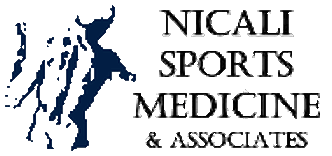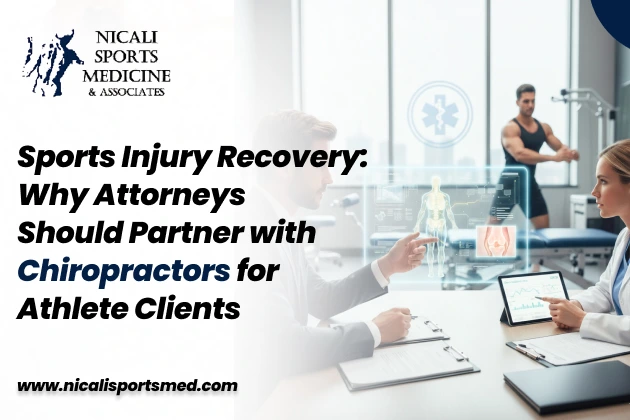Explore how attorneys should partner with sports chiropractors for athlete PI cases. Learn how expert recovery care, detailed progress reports, and return-to-play boost litigation outcomes and client satisfaction.
When professional athletes suffer from injuries like concussions, ACL tears, or spinal trauma, the time for recovery takes a long period, with complex and legal implications. Attorneys handle personal injury or sports litigation cases not just to the extent of personal injury but for long-term implications about the client’s career and quality of life.
The chiropractor specializes in sports medicine, which plays a vital role in accelerating recovery and ensuring that athletes have the best possible chance of returning to play.
Partnering with a chiropractor is not only about facilitating treatments, but it is also about aligning with experts who can strengthen case outcomes. We provide detailed reports to ensure maximum customer satisfaction. The partnership creates a steady referral stream, which allows for extending clinical impact beyond the treatment room.
This blog will explore why attorneys should partner with chiropractors for sports injury clients, like the collaboration benefits of all parties involved, and what makes the sports medicine expertise indispensable in high-profile injury cases.
The High-Class World of Sports Injuries
Athletic injury carries legal, financial, and medical difficulties compared to general personal injury cases.
Concussions and traumatic brain injuries (TBIs):
A concussion is not just about a bump. It can derail careers, trigger multimillion-dollar lawsuits, or even prompt class action cases against leagues. Attorneys need airtight medical documentation to show the injury’s impact on cognitive function, future playing potential, and long-term health risks.
ACL tears and other orthopedic injuries:
An ACL tear can cost an athlete a season and significantly reduce earning potential. Establishing the severity of injuries, recovery trajectory, and likelihood of re-injury is important in litigation involving career damages.
Spinal and musculoskeletal injuries:
From herniated discs to whiplash sustained while training and competition, the injuries demand expert recovery plans. It requires clear medical testimony to connect the injury to loss of performance, pain, or disability. Attorneys cannot succeed without objective medical evidence and ongoing treatment records; it is the parts in which chiropractors excel.
Why Attorneys Need Chiropractors to speak on their behalf.
Attorneys represent athletes in a balance of litigation with clients’ recovery goals. A sports chiropractor bridges the gap by:
- Providing Thorough Documentation for Litigation
- Every legal claim is based upon the ability to prove injury severity, treatment costs, and recovery timelines. Chiropractors deliver:
- Initial reports that detail major functional limitations.
- Ongoing progress updates showing milestones or setbacks.
- Final evaluations that clarify the extent of permanent damage or full recovery.
- The detailed reports strengthen attorneys’ negotiation power for settlements, discussions, and trial proceedings.
Strengthening Causation Arguments
Attorneys face challenges in proving that an injury was directly caused by a specific incident, like tackling, collision, or equipment malfunction. Chiropractor clinical experience and diagnostic tools are like a functional range of motion testing, posture analysis, and neurological examination—it helps to validate the causation claims.
Assisting in Claims of Future Damages
In high-profile cases, there is lost potential or diminished athletic ability that accounts for millions in damages. A chiropractor can provide prognostic assessment to establish the likelihood of re-injury and long-term limitations in maintenance care.
Rising Client Satisfaction
Athletes want more than just legal compensation. They want their career back. Chiropractors specialize in sports medicine that focuses on return to play strategies, which raises client satisfaction. When athletes see their attorneys assisting in legal and health recovery, trust deepens and improves.
How Chiropractic Sports Medicine Raises Recovery
A chiropractor trained in sports medicine brings a holistic and performance-driven approach to athletes’ recovery while ensuring that they regain their competitive edge.
- Proof-Based Rehabilitation for Concussions
- Neurological rehabilitation assists in managing headaches, dizziness, and cognitive deficits.
- Balance and coordination retraining minimizes the risk of future head injuries.
- Gradual return-to-play protocols ensure athletes meet safety benchmarks before rejoining competition.
Comprehensive ACL Tear Rehabilitation
- Manual therapy to restore joint mobility and reduce scar tissue formation.
- Target strengthening programs to rebuild muscle support around the knee.
- Biomechanical assessments to address movement patterns that can cause re-injury.
Musculoskeletal Injury Management
- Spinal adjustments for alignment and nerve function.
- Soft tissue therapies to accelerate healing of stiff muscles or ligaments.
- Sports-specific conditioning for athletes for the demands of their sport.
By focusing on both injury site and athletic overall performance systems, chiropractor shortens recovery timelines while reducing the risk of setbacks.
The Power of Detailed Progress Reports
Attorneys, progress reports are not only paperwork; they are strategic assets in litigation. Chiropractors can provide:
- Objective measures to improve the case.
- Pain and function scores that document daily limitations.
- Visual imaging paired with professional interpretation.
- Narrative summaries that explain how the injury affects sports-specific abilities.
When presented in court, the reports should have credibility.
Mutual Wins: Why Collaboration Benefits Everyone
The attorney–chiropractor partnership creates a win-win-win situation for all involved.
- For attorneys: Stronger cases that improve client satisfaction and access to expert witnesses.
- For chiropractors: Steady referral streams, professional networking opportunities, and increased visibility as trusted specialists.
- For clients: Faster recovery, integrated care, and better chances of both legal and athletic success.
Attorneys build a competitive advantage by showing care about clients’ long-term well-being; on the other hand, chiropractors use sustainable referral networks to enhance their practice growth.
Building Strong Attorney–Chiropractor Partnerships
To have benefits on long-term collaboration, attorneys and chiropractors should have:
- Clear communication protocols for sharing updates.
- Standardized reporting formats that attorneys can easily integrate into case files.
- Joint education initiatives, such as seminars or workshops on sports injury litigation.
- Referral agreements that manage the client intake process.
With seamless and professional partnership, you can have favorable outcomes.
The Future of Sports Injury Litigation and Chiropractic Care
As sports injuries become visible, through professional leagues, high-profile lawsuits, and media coverage, there are attorneys and chiropractors who play increasingly interconnected roles. From youth athletics to elite professionals, clients demand not just legal compensation but comprehensive recovery solutions.
Attorneys who partner with chiropractors position themselves as client-first advocates, while chiropractors who collaborate with attorneys want to expand beyond the clinic, shaping careers, cases, and futures.
Sports injuries like concussions, ACL tears, and spinal trauma require more than treatment or legal representation alone.
They demand collaborative partnerships between attorneys and chiropractors. By incorporating medical expertise into their legal strategy, athlete clients experience a quicker recovery, stronger litigation outcomes, and greater satisfaction.
From an attorney’s point of view, it means a stronger case and happy clients. From the chiropractors’ point of view, it focuses on steady referrals and greater recognition, as it is vital for sports medicine and legal communities. Most importantly, it means a better chance of returning to the game they love most, while securing justice and compensation they deserve.

